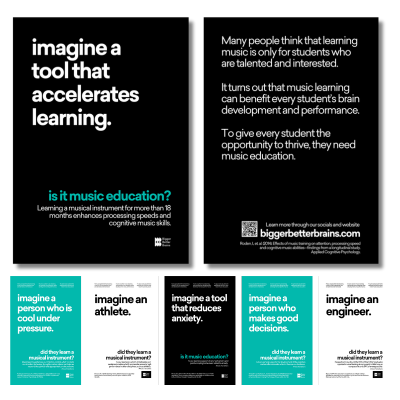
Research Updates

Here at Bigger Better Brains we believe that through educating yourself, you can then educate and affect positive change in your community.
With all of the research in the field of neuromusical science, our BBB Research section serves as a content hub for you. We regularly share findings and break down the latest research to educate and inspire discussion. We hope you enjoy this page on our website and share BBB news with your colleagues, parents and students.
Music’s Secret Genetic Power: What It Means for Language and Learning
A groundbreaking study in Nature Human Behaviour has revealed a fascinating genetic connection between musical rhythm skills and language-related traits, including dyslexia.
How Music Primes the Brain for Learning
This article delves into the transformative impact of music education, particularly for underserved students, and a strategic tool for addressing academic challenges, boosting attendance, language skills, and social integration.
New neuroscience research upends traditional theories of early language learning in babies
New research challenges traditional theories of infant language acquisition, suggesting that babies primarily learn language through rhythmic rather than phonetic information in their initial months.
Music is the Jackpot!
This video contains excerpts from an ARTSpeaks event held on November 8, 2021. In this video, neurobiologist Nina Kraus explores the impact that music learning has on young students in the areas of reading skills, sound processing, language abilities, and more.
Are neuroscientists causation happy?
Prof Schellenberg compared 114 articles about music training and brain development and then analysed the titles and abstracts for the inference of causational (one action causes another) findings and correlational (a connection between two things) findings.
Are all studies created equal?
Periodically the research community completes a systematic review, sometimes known as a literature review, of a given area of research.
Why studying music and the brain is so fascinating, and so difficult
Studying how the brain processes music and how music changes the brain has fascinated neuroscientists for almost 30 years. But these two types of studies, how the brain processes music and how music changes the brain, are also very difficult.
Music learning and literacy
“It’s about how we spend the money”. That was the catch cry of a number of politicians this week when the preliminary results from NAPLAN were released. Senator Birmingham was referring to the disappointing return on their investment in education. So Senator, what are we spending the money on?
Does music training improve a child’s maths and reading skills?
A great article from Dr Nina Kraus, one of the leading researchers in the neural encoding of speech and music.
Music and Language
Music and language: two sides of the human communication coin.
How is music related to English language reading?
This study has compared musical training with the visual aspect of reading languages. The most interesting thing about the study design is that they have compared Chinese language reading and English language reading.
Getting to the bottom of music and reading
This study is important because it is trying to get to the bottom of the neural development of the auditory and motor networks. It is, however, building on the research from musically trained children and reading.





















